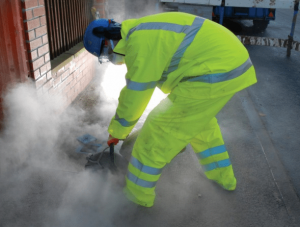EU In/Out Referendum: How could this affect Health & Safety?

I was asked a week ago what my thoughts are regarding health & safety and how it would or wouldn’t change after the referendum in June. So I thought that I would try and look at this question and see what the outcome may mean for our strongly EU law-based health and safety regime’
Don’t worry, this isn’t going to be a politically biased article for either side, but it will try and give a balanced view which hopefully, will spark a discussion on our Facebook page.
This week’s 2 recent HSE cases look at accidents that show a complete lack of compliance.
- Mr Sim was killed when he became trapped in the trench after it collapsed on him.
- As one of the workers attempted to retrieve the sheet he stepped off the side of the building, falling 14 metres, suffering fatal injuries
As ever, if you have a subject that you would like us to cover one week, please contact us by phone 01458 253682, email or via our Facebook page or by Twitter.
EU In/Out Referendum: How could this affect Health & Safety?
Since Britain joined the EU in 1973 European regulation has played an important role in protecting working people from exploitation and combating discrimination. The biggest change in respect of health and safety was the 1989 Health and Safety Framework Directive which establishes broad-based obligations for employers to evaluate, avoid and reduce workplace risks.
The Six Pack
In January 1992, six regulations on Health and Safety at Work were introduced. Most of the requirements of these Regulations were not new, they simply spelled out in more detail what a responsible employer should already have been doing to comply with the requirements of the 1974 Health and Safety at Work Act.
These Regulations were:
The Management of Health & Safety at Work Regulations – These regulations require employers, amongst other things, to:
- assess the risks to their employees and anyoneelse affected by their works.
- The employer must make arrangements for effective planning, organisation, control, maintaining and review of health and safety.
- The employer must appoint as many competent persons as are necessary to ensure compliance with health and safety laws.
- The employer must provide comprehensive and relevant training to all employees on health and safety.
Manual Handling Operations Regulations – The employer must avoid the need for workers to do any manual handling task which involves a risk of injury. When this cannot be done, the employer must assess the task taking into account the range of risk factors specified in the Regulations.
Display Screen Equipment (DSE) Regulations – The employer must make a risk assessment of all workstations which might be used by DSE ‘users’ employed by them.
Workplace (Health, Safety and Welfare) Regulations – These regulations require that the workplace and equipment must be maintained in good condition. Where appropriate, there must be a planned system of regular maintenance.
They cover such items as;
- Ventilation
- Temperature
- Cleanliness
- Traffic routes
- Welfare facilities
Provision and use of Work Equipment Regulations – These require the employer to make sure that work equipment is suitable for the purpose intended, taking into account the nature of the work, working conditions and risks in their workplace
Personal Protective Equipment (PPE) Regulations – The employer must provide suitable PPE when the risk cannot be controlled by other means.
To be Suitable, PPE must be appropriate to the risks involved and the work done. It must take account of ergonomic factors and the state of health of the user and must fit the user. It must comply with relevant European Community Directives where they apply.
There are also a range of other directives that cover the management of specific workplace risks, such as noise, work at height or machinery, as well as the protection of specific groups of workers (such as new or expectant mothers, young people and temporary workers). Specific regulations cover areas such as construction work, asbestos, chemicals, off-shore work, etc.
Indeed the TUC points out that 41 out of the 65 new health and safety regulations introduced between 1997 and 2009 originated in the EU. However, there has been a considerable reduction in pace as the European Commission has adopted a more anti-regulatory approach, in part due to pressure from successive UK Governments. The number of new directives has halved in the past five years and this trend seems set to continue, as the European Commission’s most recent Work Programme abandoned 80 health and safety proposals and introduced just 23.
Have there been benefits from the EU Membership?
It is difficult to state exactly how many lives have been saved, or how many illnesses have been prevented because of EU legislation. In the year that the Framework Directive and six-pack came into force there were 368 worker fatalities in the UK. Last year there were 142.
Overall the effect is good, especially for workers’ health and safety, although some companies may claim the regulations are a “burden”, or cost, as opposed to being a benefit to business. That is for you to discuss and decide!
These regulations cover many of the most important sectors or risk factors that lead to death injury and ill-health in the workplace such as chemical safety, carcinogens and musculoskeletal disorders. They also cover machinery safety and personal protective equipment which means that there are minimum and understandable standards that exist across Europe and which have helped prevent the importation and use of substandard or dangerous equipment.
So if the “IN” camp wins the referendum, we will retain our existing obligations as EU members to translate any EU health & safety directives into UK law.
But if the vote favours “Brexit” the position becomes more interesting. Exit would mean the end of our obligation to implement EU laws but it is still foreseeable that we would opt to do so as a part of a possible trade deal with Europe.
I cannot believe for a moment that, if we left the EU, that any Government would agree to remove any of the existing legislation from the Statute Book. I also think it very likely that the TUC would oppose the dismantling of those same health and safety laws should any Government decide to do so.
Some employers criticise EU health and safety laws as unnecessarily onerous, but even they are unlikely to support wholesale aboliotion of these standards.
It is for these reasons that I can’t predict that much is going to change any time soon regardless of which way the country votes on 23rd June.
My advice to you is to focus on identifying your own business’s health and safety risks and ensuring that you have effective systems in place to manage them. Then I don’t think you will go far wrong whatever the referendum result.
If you need further information please call us on 01458 253682 or send us an email.
Training Courses
We are running new courses again in 2016 and the dates and details of the latest courses are listed below they are:
- Treating Health like Safety
- Asbestos Awareness
- Liability for Accidents and Ill Health at Work
- CDM Regulations 2015 – An Awareness Course
- SMSTS (Site Management Safety Training Scheme)
But remember we are still available for running “In House” courses and we have now also added a new training service for our customers.
Site Manager Safety Training Scheme
(Part of Construction Skills “Site Safety Plus” Suite of Courses)
We have formed an association with a local company TQ Excel who are one of the UK’s leading providers of accredited training to the highways sector of the construction industry.
AS a result of this we can now offer the SMSTS (Site Management Safety Training Scheme)
The Site Management Safety Training Scheme forms part of the Construction Skills (CITB) Site Safety Plus range of courses which are highly regarded within the construction industry.
The 5 day training course is aimed at site managers wishing to develop a more in depth legal, moral and social understanding of their role and also teaches delegates how to manage on-site health and safety in accordance with current legislation.
We also offer the 2 day SSSTS Training Course (Site Supervisor Safety Training Scheme) which is a 2 day course aimed at those with on-site supervisory responsibilities.
We also can now offer NRSWA courses.
These qualifications are for those involved in the Excavation and Re-instatement of the highway and are specified under the New Roads and Street Works Act 1991. They are a legal requirement for “statutory undertakers” (i.e. Utility Contractors) and for those working under “section 50 licenses” (Drainage works etc).
Where works are subject to the Act there must be a minimum of 1 qualified operative on every site that is qualified for the operations being carried out and there must be a Supervisor available to visit the site at least on a daily basis.
The qualifications are also often specified by client organisations and local authorities when appointing contractors for works involving excavation or reinstatement of the highway for other purposes.
Treating Health like Safety 
Course Objective Training and CPD Certificate issued
This 1/2 day course looks at the health risks associated with industry, especially construction. It considers the health risks and looks at steps you can take to improve the health of your workforce and of your business
Seminar Outline
- Industry background
- Getting the message
- Your duties as employer
- Employees Duties
- Health risks that can be easily controlled
- Expectations of the HSE
- The way forward
Benefits of Attending
This course will give you the guidance needed to improve the health and wellbeing of your workforce and to keep your company compliant. The HSE treats non-compliance with health issues very seriously and intends to list companies that do not comply on a public register and this could affect your reputation.
Course Duration: 1/2 day – Morning 09.30 – 12.30
| COURSE REF | DATE(s) | LOCATION |
|---|---|---|
| HLS 1601 | Thursday 19th May 2016 | Taunton Racecourse, Orchard Portman Taunton Somerset TA3 7BL |
Fee: £80 to include Course notes, Coffee on arrival & mid-morning refreshments and a Certificate of Training (Fee subject to VAT)
A free lunch is also included if you book this course along with the Asbestos Awareness course below.
ASBESTOS AWARENESS – Half-Day Course 
Course Objective Training /CPD Certificate issued
Asbestos awareness training is essential for employees whose work holds the potential to expose them to asbestos. The Control of Asbestos Regulations 2012 puts a requirement on employers to ensure that their staff have undergone suitable asbestos awareness training so that they are aware of the potential dangers they may face and also the procedures they must follow in the event they are working in the vicinity of asbestos containing materials (ACMs)
Who Is This Course Suitable For?
The main groups of workers that are deemed to be at risk from asbestos exposure and therefore the groups’ most requiring asbestos awareness training are as follows:
- General Maintenance Staff.
- Electricians, Plumbers & Gas Fitters. Painters & Decorators.
- Construction & Demolition Workers. Joiners and Plasterers.
- Computing & Telecommunications Engineers.
- Heating & Ventilation Engineers.
- Roofers.
- Architects & Building Surveyors
- Fire & Burglar Alarm Installers
Syllabus
- Asbestos- a history of use
- What is Asbestos
- Amosite (Brown) – Chrysotile (White) – Crocidolite (Blue)
- Asbestos Containing Product Examples
- Asbestos Properties and the hidden legacy of asbestos
- Control of Asbestos Regs and Requirements
- Exactly who is at risk
- Action to take on discovery and Survey and Recording
Course Duration: ½ day – 13:30 to 16:30
| COURSE REF | DATE(s) | LOCATION |
|---|---|---|
| ASBESTA 1602 | Thursday 19th May 2016 | Taunton Racecourse, Orchard Portman, Taunton, Somerset TA3 7BL |
Fee: £65 to include Course notes, Coffee/Tea on arrival & mid-morning refreshments, CPD Certificate of Training (Fee subject to VAT)
A free lunch is also included if you book this course along with the CDM Regulations 2015 – For the Smaller Builder course above.
Liability for Accidents and Ill Health at Work 
Seminar Objective Training /CPD Certificate issued
This one-day course looks at your liability, as Company Owner, Director, or Manager. The course will look at a number of case studies and explain the legal requirements of the Employer, Managers, and your Safety Adviser.
Seminar Outline
- Legal framework and legislation (Criminal and civil liabilities)
- Roles and responsibilities of Directors, senior management team and the H&S Advisers
- An HSE Investigation
- Criminal Law – Who’s Liable
- The New powers of the Courts
- Compensation – Who’s Liable
- Corporate Manslaughter – The key things to know
- When it is the employee’s fault
- How to reduce your liability as an employer
- How you could be personally liable
- Successful cases against Health & Safety Advisers
Benefits of Attending
- By attending this course you will understand your liability regarding Health & Safety at work. And what you need to do to protect yourself and your business.
- How the Authorities investigate incidents and how the courts fine you.
Course Duration: 1 day
| COURSE REF | DATE(s) | LOCATION |
|---|---|---|
| LIAB 1602 | Thursday 9th June 2016 | Taunton Racecourse, Orchard Portman, Taunton, Somerset TA3 7BL |
Fee: £150 to include Course notes, mid-morning & afternoon refreshments, Finger buffet lunch, CPD Certificate (Fee subject to VAT)
CDM Regulations 2015 – An Awareness Course
Course Objective Training /CPD and APS Certificates
The Construction (Design and Management) Regulations 2015 (CDM 2015) come into force on the 6th of April 2015, and will apply to all construction projects in the UK incl. Domestic projects
This CDM 2015 awareness training course has been developed to provide all duty holders with an understanding of their role and responsibilities under CDM 2015.
Seminar Outline
- Introduction to CDM 2015
- Notification
- Client Duties and Domestic Clients
- Principal Designer Duties
- Principal Contractor Duties
- Designer Duties
- Contractor Duties
- CDM Documentation
Benefits of Attending
- These courses give an overview of the requirements for Clients, Principal Designers, Principal Contractors, Contractors, Designers and Workers, and how the regulations apply to construction projects.
- An individual who successfully completes this CDM2015 Awareness Course may claim points towards membership of the Association for Project Safety – APS
Course Duration: 1 day
| COURSE REF | DATE(s) | LOCATION |
|---|---|---|
| CDM2015 1602 | Thursday 16th June 2016 | Taunton Racecourse, Orchard Portman, Taunton, Somerset TA3 7BL |
Fee: £170 to include Course notes, mid-morning & afternoon refreshments, Finger buffet lunch, a Certificate of Training and APS Certificate (Fee subject to VAT).
Site Manager Safety Training Scheme
(Part of Construction Skills “Site Safety Plus” Suite of Courses)
Target Audience
Site managers, agents and persons who are, or are about to be, responsible for planning, organising, monitoring, controlling or administering groups of staff and workforce.
Aims & Objectives
To help site managers, agents and supervisors to:
- Manage health & safety on site in accordance with current legal provisions, and within the context of their management or supervisory role
- Develop an understanding of responsibilities and accountability for site health, safety and welfare
- Recognise that a safe site is efficient, economical and productive
Delegates will, at the end of the training, be aware of and able to:
- Implement all health, safety, welfare and environmental legislation which affects them during their work
- Implement new guidance and industry best practice
- State their duties and responsibilities with regards to health, safety, welfare and the environment
Course Notes / Assessment / Certification
This 5 day Course will be held at The Oaktree, Bristol Road, Edithmead, Highbridge, Somerset TA9 4HA (6th – 10th June 2016)
The all-inclusive rate of £495.00 + vat per delegate will be payable at the time of booking.
If you have any questions about these courses or any other training or would like us to run a particular course for you, call Jon Wilkins of the Wilkins Safety Group on 01458 253682 or email him.

Your business is safer in our hands
